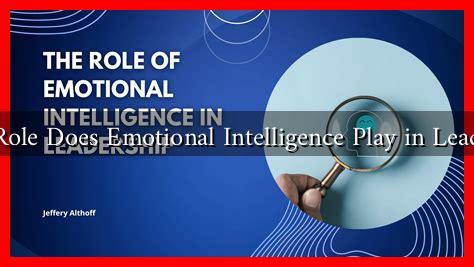-
Table of Contents
- What Role Does Emotional Intelligence Play in Leadership
- Understanding Emotional Intelligence
- The Importance of Emotional Intelligence in Leadership
- 1. Enhanced Communication
- 2. Conflict Resolution
- 3. Building Trust and Relationships
- 4. Inspiring and Motivating Teams
- 5. Adaptability to Change
- Case Studies and Statistics
- Conclusion
What Role Does Emotional Intelligence Play in Leadership
In today’s fast-paced and ever-evolving business landscape, effective leadership is more crucial than ever. One of the key components that distinguish successful leaders from their peers is emotional intelligence (EI). This article explores the role of emotional intelligence in leadership, its components, and how it can significantly impact organizational success.
Understanding Emotional Intelligence
Emotional intelligence refers to the ability to recognize, understand, and manage our own emotions while also being able to recognize, understand, and influence the emotions of others. Daniel Goleman, a psychologist and author, popularized the concept in the mid-1990s, identifying five key components of emotional intelligence:
- Self-awareness: The ability to recognize one’s own emotions and their effects.
- Self-regulation: The ability to manage one’s emotions and impulses.
- Motivation: A passion for work that goes beyond money and status.
- Empathy: The ability to understand the emotional makeup of other people.
- Social skills: Proficiency in managing relationships and building networks.
The Importance of Emotional Intelligence in Leadership
Leaders with high emotional intelligence can create a positive work environment, foster collaboration, and drive performance. Here are several ways in which emotional intelligence plays a vital role in leadership:
1. Enhanced Communication
Effective communication is a cornerstone of successful leadership. Leaders with high EI can articulate their thoughts and feelings clearly and are also adept at reading non-verbal cues. This ability allows them to tailor their communication style to suit different team members, fostering a more inclusive atmosphere.
2. Conflict Resolution
Conflicts are inevitable in any organization. Leaders with strong emotional intelligence can navigate these conflicts more effectively. They can empathize with differing viewpoints, facilitating discussions that lead to constructive resolutions. For instance, a study by the Harvard Business Review found that leaders who demonstrate empathy can reduce employee turnover by up to 50%.
3. Building Trust and Relationships
Trust is essential for any team to function effectively. Leaders who exhibit emotional intelligence are more likely to build strong relationships with their team members. They are approachable, listen actively, and show genuine concern for their employees’ well-being. This trust fosters loyalty and increases employee engagement.
4. Inspiring and Motivating Teams
Leaders with high emotional intelligence can inspire and motivate their teams by understanding what drives each individual. They can align team goals with personal aspirations, creating a sense of purpose. For example, Satya Nadella, CEO of Microsoft, transformed the company’s culture by emphasizing empathy and collaboration, leading to a significant increase in employee satisfaction and productivity.
5. Adaptability to Change
In a rapidly changing business environment, adaptability is crucial. Leaders with high emotional intelligence can manage their own emotions during times of change and help their teams navigate through uncertainty. They can provide reassurance and support, which is vital for maintaining morale during challenging times.
Case Studies and Statistics
Numerous studies have highlighted the impact of emotional intelligence on leadership effectiveness:
- A study by TalentSmart found that 90% of top performers have high emotional intelligence.
- According to a report by the World Economic Forum, emotional intelligence will be one of the top skills needed in the workforce by 2025.
- Research from the University of Massachusetts found that leaders with high emotional intelligence are more likely to achieve their goals and drive team performance.
Conclusion
Emotional intelligence is not just a buzzword; it is a critical skill that can significantly enhance leadership effectiveness. Leaders who cultivate their emotional intelligence can improve communication, resolve conflicts, build trust, inspire teams, and adapt to change. As organizations continue to evolve, the importance of emotional intelligence in leadership will only grow. Investing in emotional intelligence training for leaders can lead to a more engaged workforce and ultimately drive organizational success.
For further reading on emotional intelligence and its impact on leadership, you can explore resources from the TalentSmart website.

